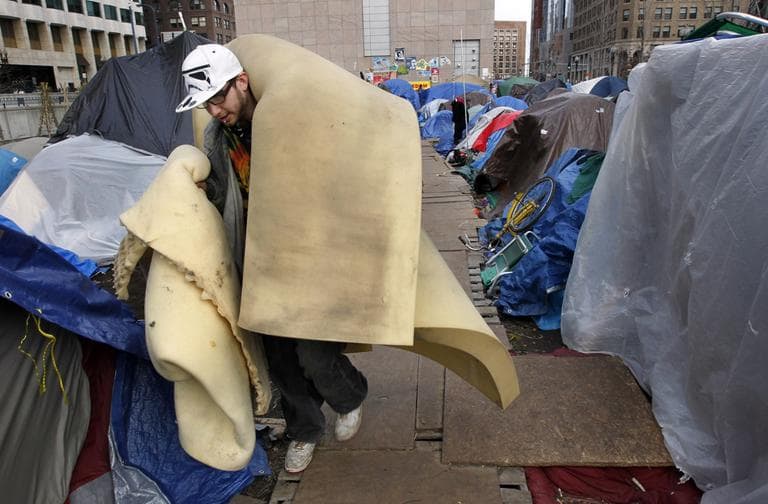Advertisement
After Ruling, Occupy Boston's Dewey Square Days Could Be Numbered
Resume
Occupy Boston’s days at Dewey Square could be numbered. In a ruling Wednesday, the state Superior Court said the city can evict the tent camp from the Greenway if it finds the encampment violates health and safety rules.
Lawyers for Occupy Boston said they will appeal the ruling, while the city said it’s time to start taking down the tents.
The decision by Judge Frances McIntyre said that while protesters may be exercising their expressive free speech rights during their protest, they have no privilege under the First Amendment to "seize and hold" the land. And they also fall under city and park regulations about fire, health and sanitary codes. This gives the city the legal right to evict the demonstrators.
In a relentless rain Wednesday night, this is how Ben Wish, one of Occupy Boston's lawyers, explained the ruling to the protesters:
The mayor said he strongly encourages the movement to remove their tents and stop camping in the area. Protesters say that won't happen.
"What she said was protected speech was living here, doing all the things Occupy Boston does, what she said was not protected speech under the First Amendment was what she called 'actually occupy,' and the reasons she said her idea of actually occupying is what she thought of as taking the property," Wish said.
In the ruling, the judge said that “occupation” is viewed as a hostile act and not considered speech. This surprised many protesters, including 19-year-old David Lehnert from Framingham.
"What I would disagree with is that she said that our occupation provokes hostility and violence. Which I disagree with, because our whole point of being here is to be an open forum for everyone to come and share their opinion, which has been happening and hopefully will continue to happen," she said.
The judge’s ruling noted that the encampment has up to 150 people living in tents in a small space that has no running water. It notes that while toilets are available nearby at South Station, not all occupants make that trip.
"I understand their concerns about safety, but honestly it's hypocrisy," said Noah McKenna, one of the protesters.
"Do you feel there are fire safety, sanitary problems here?" I asked him.
"Of course, look around, that tent is on top of that tent, there’s no way to get through there. This is an unsafe environment. It is because the city is not letting us make it safe."
The city has prohibited demonstrators from preparing for winter by bringing in new materials. A written statement from Boston Mayor Thomas Menino said that conditions at Dewey Square are deteriorating significantly and pose very real health and safety risks. The mayor said he strongly encourages the movement to remove their tents and stop camping in the area. Protesters say that won't happen.
"I guarantee you people are not going to just leave. I guarantee you that. It’s going to be a good moment for us to demonstrate that we are peaceful and that we are committed to the idea of occupying," McKenna said.
The lawyers for Occupy Boston will appeal the ruling, and hope to get the temporary restraining order back in place while the case is passed up to a higher court.
-- Here's the judge's ruling (on Scribd):
http://www.scribd.com/doc/75049440/Judge-Denies-Occupy-Boston-An-Injunction-Against-Camp-Removal
This program aired on December 8, 2011.